They produce 80% of the food that reaches the Argentine tables regardless of social class. In their activities they condense 70% of rural work, but they cultivate in hardly a quarter of the agricultural lands of the country, and only 40% of them own the lands on which they produce. They refer to themselves as the «other farmers» compared with the export-focused industrial agribusiness. As Argentina confronted the threat of Covid-19, the agricultural productive matrix grew began to be even more questioned. Toxic agro-chemicals in crops, feed-lot cattle, environmental depredation: images of a lost, sick and out of control capitalist food production for humans and increasingly for animals. While we’re apportioning blame, the alternative, that of a peasant agriculture and an indigenous «Campo» of small producers, strengthens as a solidarity response, supplying healthy cheap food confronting corporate speculation which is primarily focused on meat and forage exports. On April 17, on the International Day of Peasant Struggle, we interviewed one of the leading organizations in this field: the National Indigenous Peasant Movement (MNCI) «We Are Land» (Somos Tierra).
Federico Hauscarriaga, ANRed
«We are about ten thousand peasant families throughout the country,» Martha explained. She has chosen to work on educational tasks in the organization. She tells us that everything they teach in the two peasant agroecology schools, one in the Wine Province of Mendoza, and another in the neighbouring Province of San Juan, is derived from proposals for «Another Campo», which has agrarian reform and food sovereignty on its political horizon. The «MNCI Somos Tierra» is one of the peasant organizations that make up the world of «family agriculture», the sector that provides 80% of the food consumed by human people Worldwide, in a context where, according to a report by the Food and Agriculture Organization of the United Nations (UN/FAO), nine out of ten of the 570 million farms worldwide are managed by families.
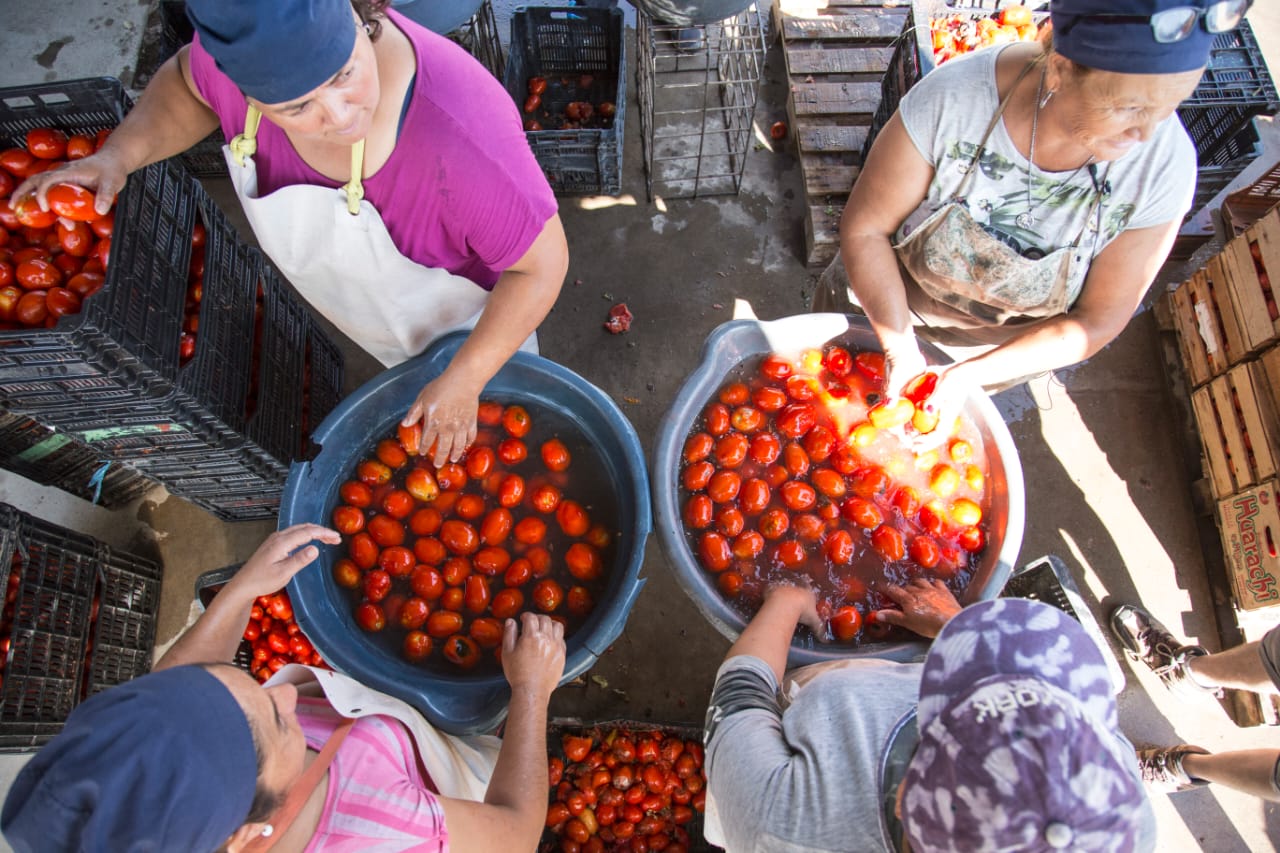
Misiones: «We are taking market goods to the neighbourhoods»
In the north and east of the Argentine Province of Misiones (in the North of Argentina) more than 300 families are organized in cooperatives, neighbourhood organizations in rural areas or near urban areas. They are composed of small farms that do not exceed 80 hectares. They produce manioc, corn and beans, but they also have gardens for the community’s own consumption. «We have chickens and pigs, and some families have dairy cows for self-consumption or for cheese and milk production. There are also small producers of tobacco, which although our organization does not agree with these crops, it is a reality that some comrades are imprisoned in this production. On a smaller scale, Yerba Maté, [the Argentine energising tea] is also produced», says Pedro Lunello, who emphasizes that they are making an effort to produce vegetables and seasonal fruits. «Adding value to our healthy products» is one of the objectives, he says, «through the production of preserves to be sold in a popular shop in Puerto Iguazú».
With the threat of the pandemic, the organization continued to produce and to bring food to the neighbourhoods/Barrios. «Before the pandemic we were already delivering food through social networks. Now we are bringing merchandise to the Barrios of the local town of Puerto Iguazú, the centre for Argentine tourism for popular attraction Iguazú Falls. Some of this food we distribute, some of it is to organize in the neighbourhoods soup kitchens with a sister organization called Colectivo Social Iguazú (a social collective for popular food dissemination). A multitude of people arrive feeding themselves for this initiative. The distribution is done with funds and vehicles from our comrades. A little help is given by the Argentine National Institute (INTA) northern Argentina office, and some transportation from partner organizations,» says Pedro.
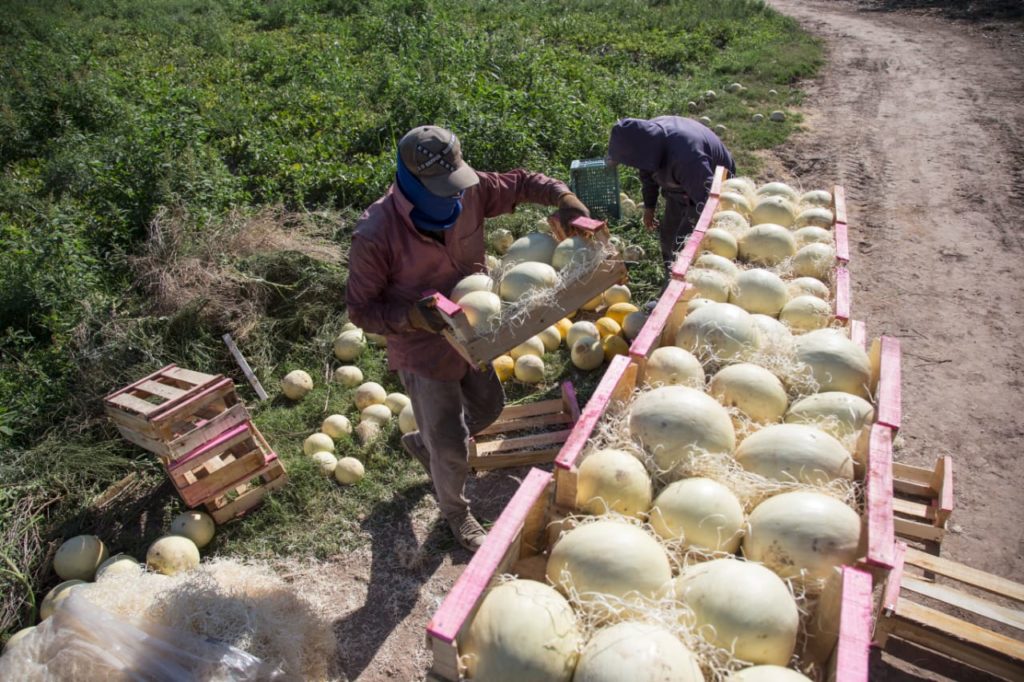

Mendoza: «We manage to produce very good food and always at prices that a worker can afford.»
The Union of Landless Rural Workers (UST) is present in different (sub-provincial «Departments») of the Province of Mendoza but especially in the northern part. The communities are organized in grassroots groupings or grouped by produce which is where problems arise. They operate work cooperatives with different profiles especially when it comes to the particularities of Mendoza’s water supplies, a province where agricultural production often depends on irrigation. «There are areas that are oases like Valle de Uco or San Rafael and some other areas which take supplies from underground rivers, but the rest of the province mostly consists of dry semi-arid or desert zones.» It is there that the prevailing production includes goat farming, beekeeping, and handicrafts. In the zones where there is little irrigation there are many horticultural producers, and we’ve also developed small-scale industries based on what primary products we produce. They are small, artisan establishments and are capable of producing for three departments locally. We produce whole tomatoes, triturated tomatoes, jams, and fresh fruits, etc. Many of our colleagues also work from home, especially making jams,» says Natalia Manini, who is part of the production team.
When it comes to comercialising products and sales, families also find various ways to sell their products, «We have been incrementally incorporating different schemes. One of these is direct sales which take place at markets, where producers meet consumers. Also in different trading networks but always related to the solidarity and popular economies. These networks exist in different provinces and we are in contact with them. In Buenos Aires we sell in the UTT stores but also with networks such as the Institute for Popular Production, Closer is more Just (Más Cerca es Más Justo), Snails and Ants (Caracoles y hormigas), Bridges in the South (Puentes del Sur), etc. In the department of Lavalle we are delivering bags in an agreement with the Municipal economic development of that town. They provide the vehicles for distribution. The municipality of the town of La Paz have also bought from us so that they can distribute bags to the most remote homes in their area.
We have also had the chance to trade with some Institutions such as the public ambulance network (PAMI), and to some restaurants, and there is also the general public when they come by our establishments.
«Despite the epidemic, our production continues. There are some logistical problems in some rural zones that are further away and access to government benefits such as the EFI (Family Emergency Income scheme) and there’s the lack of Internet. In the plantations there are shortages of inputs due to the problems in the industrial sector, for example we are not getting tin-cans or jars. The organization is trying to maintain production with all the safety measures in the communities not only to provide food for our families but also for the general public.
During the pandemic, vegetable sales have increased. There is a marketing scheme mainly in Buenos Aires in the UTT markets and also during the quarantine we’ve developed a direct sale of bags of vegetables in two Departments, Lavalle and San Rafael and in the city of Mendoza. We will be delivering about 2,500 bags weekly and we commercialize packaged products there too. We’re trying to add to the number of producers and establishments in the chain of production always with the idea of bringing healthy food to people. We do not use any preservatives. We are moving towards agroecology and these same foodstuffs are then used in the factories to make goods. We manage to make very good produce and always at prices that a worker can afford.».
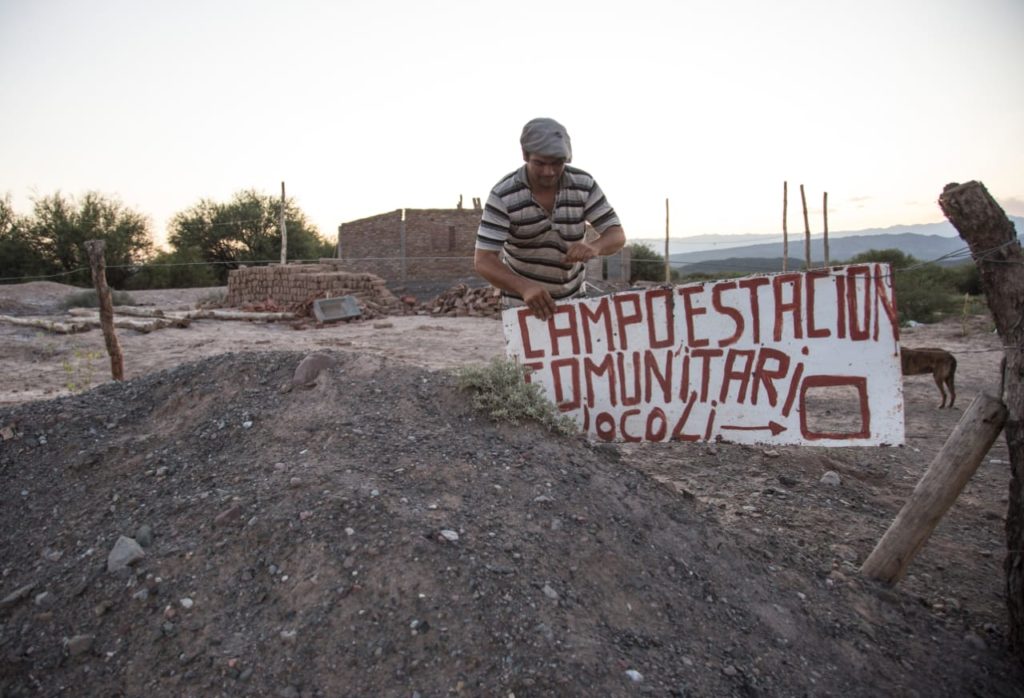

Córdoba: «The pandemic has demonstrated that globalised capitalism has reached a critical juncture.»
In Córdoba, the MNCI Somos Tierra (Vía Campesina affiliates in Argentina close to Fernández de Kirchener Peronism) organizes about a thousand families and has been working in the northwest of the province of Córdoba for 20 years. Apart from the families who live in rural zones, recruitment in mid-sized towns have been added also, many of these families had been displaced off nearby land. The grassroots organizations function through community reunions that appoint delegates to attend regional meetings, who are then in their turn, centralized in a provincial body. «For the last twenty years we have been trying to build actions that don’t just solve day-to-day problems but also strengthening the conditions for families to continue living in the countryside and continue being productive actors. One of our latest achievements is that in Córdoba it is recognized that there are peasant families, that they exist and that they have the right to their rights. We have been strengthening the ongoing productive processes that families have traditionally have had as part of what they do. These farming tasks have been done by women as they have been active in supporting the community», explains Pablo Blank.
Large-scale agriculture, the real estate business and mining have deforested the Mediterranean province at a record speed. Peasant families live from the forest, «In this province we also carry out work linked to the care of the forest. But the main activity is rearing goats, though this is growing and diversifying, in what we call products which are derived from the forest. We are doing a lot of beekeeping, goat cheese, dulce de leche (sweet concentrated milk product), creams with elements from the forest, herbal extractions, wood and also preserves (jams) in areas close to towns». As far as distribution is concerned, he explains: «in Córdoba we have opened two commercial premises, in the Provincial capital (the city of Córdoba) and another called Traslasierra in the town of Villa Dolores, which supplies retail stores that sell natural products, markets, consumer networks, and joint spaces for selling. We also deliver to other organizations in other provinces that have their own sales outlets».
With the arrival of Covid-19, we have experienced an increased demand for small producers and for those who offer products that are free of agrotoxins and which are considered to be produced in ways compatible with care for the environment. «Since the pandemic we have noticed a very large increase in the demand for healthy peasant food», says Pablo, «This has meant that our shops are moving a lot of merchandise and we have increased consumer sales networks in the city of Córdoba and in other areas with home deliveries of bags of produce reaching neighbourhoods in quarantine. I believe that peasant organizations can become purveyors of food for all sectors. The quarantine has broken the previous shopping routines, so that consumers question certain practices, which they had previously naturalised, like buying the first thing they lay their eyes on in the supermarket. Now we have a chance to see things from an alternate perspective and to generate other connections, to consume different kinds of food. There is more awareness of what we’re eating. What we have noticed is that being an organisation with so many years of experience has given us a structure with mobility, shops that are working, having networks and a well-oiled logic which helps us to get through this crisis and we can help other producing families. A cultural change is needed, and the Argentine State will need to understand the importance of healthy food which generates work, that is sold at a just price and that resolves nutrition issues. The pandemic has brought to the surface that globalised capital has reached a critical juncture, that it is unable to provide a response to the issues the pandemic has raised, and that we need a courageous change to bring another kind of food production which is not focused on the profit motive» he says.
Pablo sees that this sector will have an increased importance in the future when we again confront a worsening economic crisis and he notes the necessity for policies that strengthen good practices: «We know that the presence of the State is key. There is much for us to do, such as enabling us to bring this food to the working class, to provide places for collection, to make the authorization of products — products of impeccable quality — more flexible to overcome the cumbersome paperwork that makes it difficult to get products to market in the cities. By guaranteeing logistics and by making payments quicker to producer families, the difficulties cease. In the Province of Cordoba we’ve reached limits for deforestation, and for the encroachment of agribusiness, among other things. Thanks to the organizations on the ground, these issues have achieved increased visibility and have been stopped. Today, the dispute with agribusiness has to do with their capturing public resources (subsidies etc…), but there is also an ideological dispute for the recognition of another way to farm, a different way to provide foodstuffs. There are some critical axes such as the Native Forestry Protection law (the «Ley de Bosques», Law number 26,331) which is an active law but which is ignored by powerful interests like many laws in Argentina. Also provincial subsidy programmes for good agricultural practices. These laws have been deferred to the Provinces by an inactive National State such as the Provincial laws for the approval of the Law 27,118 (LEY DE REPARACIÓN HISTÓRICA DE LA AGRICULTURA FAMILIAR) approved in 2015 but never made active, Peasant and Indigenous Agriculture, that last year was achieved at a provincial level but not nationally. In these disputes we are asking for recognition of the peasant organizations and families as beneficiaries and implementers of these policies,» says Pablo.
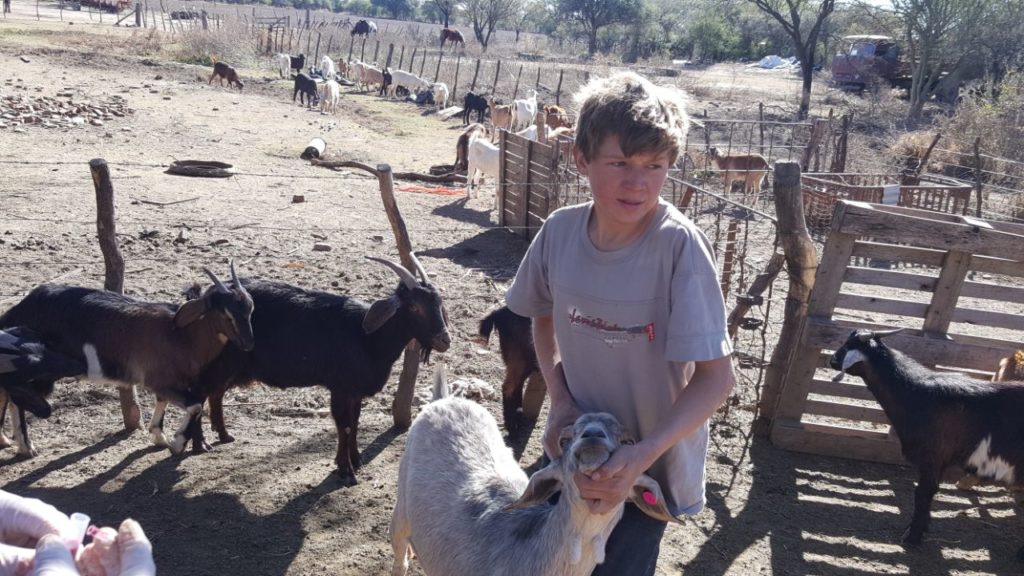

Neuquén: «We are promoting the declaration of a food emergency in the province and asking for to convoke emergency committees».
For more than 15 years the organization has been bringing together families from different localities and rural areas. In the north, the peasantry is generally dedicated to raising goats and, to a lesser extent, cattle. In some areas there is horticultural production too, but «the main product is goats, and some families also produce dairy products and some preserves» says Silverio Alarcón. «Here, in the north of Neuquén, nomadic herding is done. The animals are moved from Winter to Summer fields and vice versa. This management is done by farmers to allow for field (crop) rotation and take advantage of the pastures that are in the foothills that cannot be worked in winter. We do collective work in families and now we are starting to add value to goat meat. We are setting up a sausage production room with cattle that are lost or don’t sell well. This way we can provide products for the local area and for other provinces.»
The pandemic has brought difficulties for the main activities in the area, the situation is repeated in all provinces and organized communities are looking for alternatives to overcome the obstacles, as well as to bring their urgent movements for change to a head and bring proposals. Silverio Alarcón tells us, «In Neuquén what is happening is that we are in the period of good pastures. March is the time for branding animals, and with this sanitary issue many farmers have not been able to hold these end-of-summer sales, which is very important, because it is the basis for getting through the whole year and to be able to buy food to get through the winter and animal fodder too. The lack of sales becomes a big problem for these families if they can’t sell, and there are many days of droving to the winter pastures. These animals will get thinner and lose their marketability. We ask that the State buys the animals from the families who raise them and that they can be slaughtered and sold at popular prices in the neighbourhoods where there is a shortage of such food. Also local fairs have been suspended and we trying to get dialogue with municipalities in order to market the products. We are promoting the declaration of a food emergency in the province and the convening of emergency committees in the localities where peasant organizations can participate. This crisis is affecting the poorest of people. So we are saying that one must bring solutions to the ones with the most urgent needs, to the most vulnerable people.»
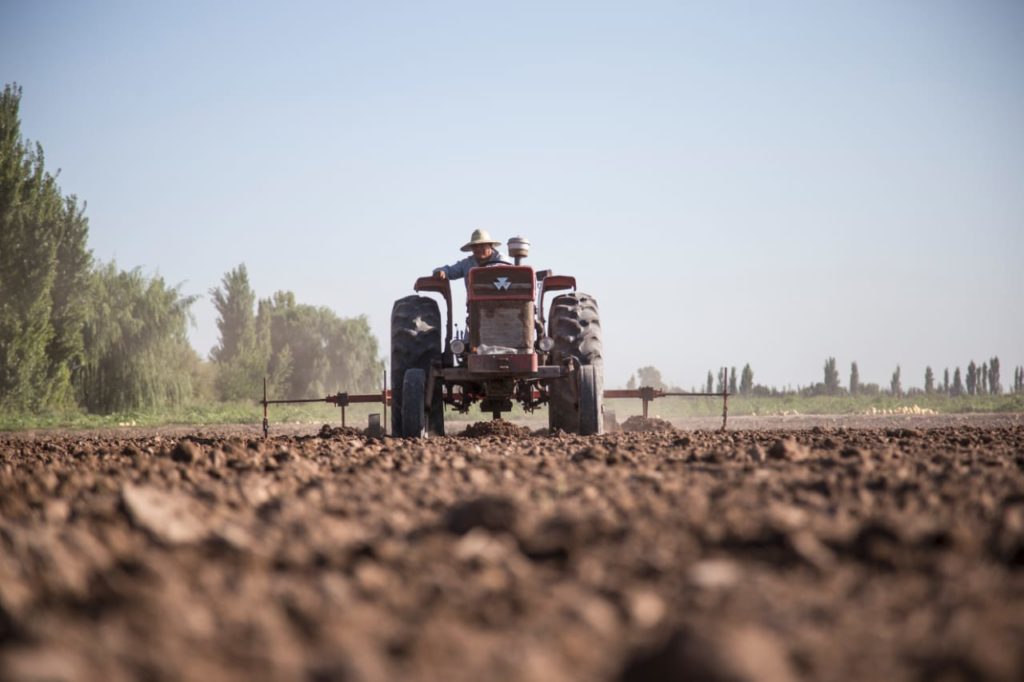

Diego Montón is one of the spokesperson for the organization and is also part of the Operational Secretariat of the Latin American Coordination of Rural Organizations (CLOC), he explained the general situation of small producers to us in the context of the pandemic: «the situation differs depending on the multiple realities faced by the sector. The day-to-day work continues although in some areas there are difficulties in getting supplies. Some villages have been blocked because there are different dynamics depending on what mayors decide about circulation rules, and this has changed the way peasants normally work. Access to the different government aid programs has been very complex because often there is little Internet connectivity and there are different dynamics in the flow of information.
The situation is also different in rural areas for peasant families who live in rural villages where there are very small ranches and quarantine is really difficult. In spite of this, families continue to work hard and we see experiences of peasant solidarity to continue taking their production to consumers, maintaining the price in the context of speculation and price increases in the most concentrated sectors. Of particular interest are the experiences that are taking place throughout the country with delivery of bags of vegetables, fruits, preserves, all kinds of dairy products, where the family farming sector and some agricultural Small and Medium sized Enterprises (SMEs) have been making great efforts to confront the concentrated sectors which are trying to take advantage», says Montón, who also answered some more questions on this issue.
Q: – Do you think this production model is responsible for the expansion of this epidemic, and as a counterpart to that first question I would ask, is family agriculture being re-evaluated for the production of healthy food?
A: – There are many studies that confirm the relationship between the expansion of this epidemic and large farms that concentrate animals into small spaces, especially feed-lots, which would affect the dynamics of the mutation of the virus and the aggressiveness of infectivity. We have avian flu, swine flus, and others. There is a lot of data that relates this and questions this type of production, and at the same time values agroecology and alternate forms of production that are not governed by the single concept that drives agribusiness which is profit. All of this diversity in agriculture such as family farms, indigenous methods, small-scale and small farm agriculture. It’s about the reproduction of life. Therefore, they are totally different dynamics. For more than 10,000 years these family agriculture units have supplied humanity with food.
This agriculture brings genuine employment to the countryside and seeks a balance with nature. In this sense, the declaration of the United Nations, after eight years of debates, and where all the states participated, concluded by declaring the significance of the ‘peasant’. It is a declaration that is not only about the violations of rights but also on the important role of peasant agriculture, the importance of food sovereignty, and which enumerates State obligations. The declaration says that peasant agriculture is fundamental to solve the food and climate crisis, and that States must exercise policies to guarantee those rights. The UN sets out obligations to States that must guarantee the right to land, with policies such as agrarian reform, food sovereignty, or intervention in markets to ensure adequate prices and which will guarantee a certain standard of living for peasant families. Access to seeds, preservation of biodiversity or women’s rights. In other words, it is urgent to change this agri-food system.
Q: – Have you been able to speak with the municipalities? What measures do you think the State could advance in the context of this crisis?
A: – In Mendoza we have been working with municipalities on the issue of the distribution of bags of vegetables. Our arrangement is that the municipality provides the logistics, its structures, and facilitates the distribution of food bags by the organizations for a fair price. Another of the fundamental things is that the State guarantees to control and really fines people for breaking rules or exceesses. So that when speculation happens in crisis as is the case now, it can intervene directly. Even expropriating if that proves necessary. At the national level we could bring back what used to be the «Fruits and Vegetables for All», prioritizing purchasing from small producers.
Also one might think about forms of financing so that the sector can increase productivity, something dependent on planning and on forecasting demand. Another key is how to invest in local industry that can add value to primary production. We are talking about preserves, trituration (of tomatoes fro example) and dairy products, which have a large lack of investment. In this sense, the arrival of the UTT to the Buenos Aires Central Market, a wholesale market designed for a population of more than ten million people, is a change of logic, Mr. Nahuel Levaggi is a UTT member hand he’s now head of the market since the government has changed back to Peronism. Surely he will make the market work so that the peasant families havd direct access — bypassing intermediaries — and that the market serves to continue organizing the non-industrial agriculture sector, to diminish intermediaries between producers and consumers.
Q: – In this sense, what limits do the small producers confront?
A: – The situation is structurally complex: there is huge concentration of ownership in the industrial agriculture sector which subordinates family agriculture for the added-value and, on the other hand, there is a strong concentration of the market, which also subordinates family agriculture, and this is to the detriment of consumers. Here we find products on the market that are sold at 500% more than what the producer is paid. These are clear limits. In addition there are the food habits and consumption that these elites of the industrial agriculture have managed to inculcate so that people consume their processed foods, which are generally harmful to one’s health, and not the same healthy foods that they could buy from family agriculture. Another of the fundamental limits is the concentration of land. Sixty per cent of our sector does not have land and must lease it, and this means some of our sweat goes to the landowner. Part of the agroecological sector also has irregularities in land titles, and so they can be exposed to situations of violence. This prevents them from accessing credit, which is a fundamental issue for financing both value-added infrastructure and for improving irrigation technology and work in the field.
Translation: Tony Phillips, Photos: MNCI «We are the Earth» (MNCI Somos Tierra)
